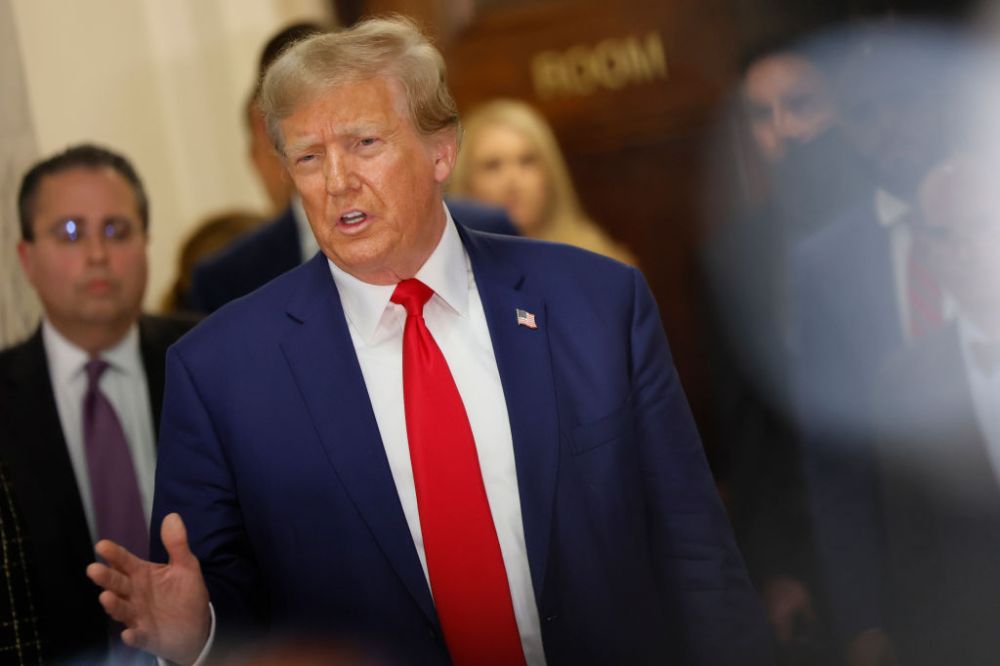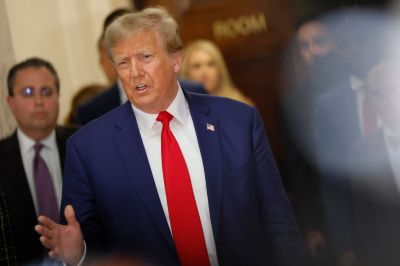Welcome to our post-Iowa, pre-New Hampshire edition of The Collision.
The Docket
- Fresh off his win in Iowa at the beginning of this week, former President Donald Trump appeared at the start of his next civil trial, in Manhattan. The trial stems from a lawsuit from writer E. Jean Carroll, who is seeking millions in damages for defamatory comments she says Trump made after Carroll accused him, in 2019, of raping her in the mid-1990s. Trump has already been found liable in one civil trial for sexually abusing Carroll, and the same jury awarded her additional damages for defamation. This current trial will determine what damages Carroll can be awarded for his initial public comments about her when she published excerpts from her book in 2019 making the rape accusation.
- Trump found himself going back and forth this week between New York, to appear at the trial during the day, and New Hampshire, where he has had rallies most evenings. He was at jury selection on Tuesday (the New York Daily News said he “scowled” as the details of the case were explained to the jurors), and he made noises and comments of protest on Wednesday as Carroll was on the stand—prompting Judge Lewis Kaplan to warn Trump’s counsel that he could be removed from the proceedings if he continued to grumble in front of the jury.
- The Washington Post reports: “Nearly 180 congressional Republicans signed on to an amicus brief to the U.S. Supreme Court in support of Donald Trump’s legal battle to remain on the primary election ballot in Colorado.” Among the names listed in support of keeping Trump on the ballot were Sen. Mitch McConnell—notable since the Senate minority leader has been the target of Trump’s derision and even racially motivated attacks in recent years. McConnell has also criticized Trump recently, even as a growing number of his own conference in the Senate have endorsed Trump for president.
- Things are getting ugly in Fulton County, Georgia, where District Attorney Fani Willis is firing back at the estranged wife of one of her special prosecutors working on the Trump election interference case. Last week, we outlined the accusations made by the legal team of one of Trump’s codefendants that Willis and the prosecutor, Nathan Wade, had an improper personal relationship and that the DA was subpoenaed to testify in Wade’s divorce hearing. Now, in a filing protesting the subpoena, a lawyer for Willis is accusing Wade’s wife of trying to sabotage the case against Trump.
The Primary Collision That Never Was
CONCORD, New Hampshire—When we launched The Collision in July, we assumed the race for the Republican presidential nomination would be driven in part by the swirl of legal drama surrounding Donald Trump. The former president had already been indicted twice—once in New York, and once by the feds—and two more indictments would soon follow in August.
Given Trump’s lead in early polling, his opponents needed to challenge him directly in order to win the GOP nomination. And what could be a more glaring weakness to exploit than criminal charges—in particular the straightforward charges of mishandling classified documents? But as Republican operatives working for some of his rivals told The Dispatch, the general belief within many of the campaigns was that there was no benefit to going after Trump for his alleged crimes during the primary.
The strategies of Trump’s opponents have borne that out. With Monday’s caucuses in Iowa, the presidential primary season is officially underway, and the former president’s legal problems have simply not been a major factor. The only two candidates to directly criticize Trump for the behavior that led to his indictments—former governors Chris Christie and Asa Hutchinson—have both dropped out. Another recent dropout, Vivek Ramaswamy, actually campaigned on the promise of pardoning Trump “on day one.”
For most of the past year, none of the other candidates tried to make a sustained argument against Trump—not on the substance of the charges, and not on the political risk of nominating an indicted or even convicted felon. In fact, their approaches generally affirmed Trump’s own argument that he was being targeted politically and that there was no “there” there.
In the first primary debate, every candidate but Christie and Hutchinson raised their hand and pledged to still vote for Trump if he were to win the nomination—even if he were convicted of a felony by that time. When the second federal indictment, related to Trump’s efforts to overturn the 2020 election, dropped in August, Gov. Ron DeSantis’ reaction was to promise to “end the weaponization of government, replace the FBI Director, and ensure a single standard of justice for all Americans.” Sen. Tim Scott decried a legal system “being weaponized against political opponents,” while former U.N. Ambassador Nikki Haley said Americans were “exhausted by the prosecutorial overreach, double standards, and vendetta politics.” Both Haley and DeSantis have said they would pardon Trump if he were convicted, though they each suggested their motivations for doing so would be to deescalate political divisions.
In the months since, some of the rhetoric from the remaining contenders about Trump’s legal challenges has shifted. Haley, for one, has taken to referring to his indictments obliquely. “The reality is, rightly or wrongly, chaos follows him,” she said at a recent CNN town hall. “And we all know that’s true. Chaos follows him. And we can’t have a country in disarray and a world on fire and go through four more years of chaos.” That’s been a key part of her closing message here in New Hampshire, where her coalition includes the sort of voters who don’t like Trump anyway.
DeSantis, meanwhile, has openly complained that prosecutors pursued the charges, arguing the indictments “distorted” the Republican primary race and moved debates away from important issues. “It also just crowded out, I think, so much other stuff,” he told Christian Broadcasting Network last month. “And it’s sucked out a lot of oxygen.”
We asked some Republican strategists, some of whom worked for candidates in the field, why no one besides Christie and Hutchinson even tried criticizing Trump over the crimes he’s been charged with. Their collective conclusion: The upside of doing so was nonexistent, and the downside for targeting Trump on his legal woes would be catastrophic.
“Voters side with him,” said one GOP strategist. “The majority of base voters feel he’s being unfairly targeted.”
Another strategist working for a rival presidential campaign said a few factors were at work, including what this person considered a blatantly political indictment from Manhattan District Attorney Alvin Bragg coming first and the fact that the federal charges come from a Department of Justice overseen by President Joe Biden. “Trump locked down our voters. They came back to him because it looked like political persecution,” said the second strategist.
And why didn’t the field target Trump on the substance of the charges, particularly on the relatively straightforward classified documents case? “You’d then be defending the Biden DOJ’s actions,” the second strategist said.
In other words, there was no political value for a Republican presidential candidate to side with Democratic prosecutors going after Trump, by far the most popular Republican in the field. With that in mind, the candidates running to beat Trump either avoided the collision or, like Christie, embraced it wholeheartedly. Yet each of Trump’s rivals is now in the same place: out, or nearly out, of contention. DeSantis came in a disappointing second place in Iowa, and Haley seems destined to do the same in New Hampshire. And all the while, Trump is driving confidently down the road to the nomination.
A Correction, and the Latest on Maine’s Efforts to Bar Trump From the Ballot
Sarah here: Earlier this week, a judge in Maine paused the recent decision by the secretary of state to keep Donald Trump’s name off the ballot there, pending the U.S. Supreme Court’s review of a Colorado removal of Trump from the ballot in that state.
We covered both states’ decisions to deny Trump access to the ballot based on the 14th Amendment a couple of newsletters back. In doing so, I wrote:
Maine’s process was even more arbitrary, to the point of being nonexistent. We don’t know what standard the secretary of state used or what evidence she considered before declaring the former president ineligible. And Trump wasn’t allowed to defend himself before losing the right to run for office.
I was wrong. The Maine secretary of state followed Maine's administrative procedures process, which relies on a “preponderance of the evidence” standard and an administrative hearing. The state gave Trump notice of the hearing and an opportunity to respond, and his team did respond. You can read her entire decision here.
Blogger and lawyer Patrick Frey, aka “Patterico,” pointed out the factual errors in my write-up, and we appreciate him for doing so.
I also wrote that, “Although the Supreme Court will be considering only the Colorado case, Maine’s action to keep Trump off the ballot could underscore the problem with state officials trying to enforce a standardless provision of the Constitution that doesn’t specify who does—or doesn’t—get to enforce it.” That’s still true.
Back to the Maine Superior Court Justice Michaela Murphy’s decision, which confirms that the Colorado case is the more important of the two. “Put simply, the United States Supreme Court’s acceptance of the Colorado case changes everything about the order in which these issues should be decided, and by which court,” she wrote. “And while it is impossible to know what the Supreme Court will decide, hopefully it will at least clarify what role, if any, state decision-makers, including secretaries of state and state judicial officers, play in adjudicating claims of disqualification brought under Section Three of the Fourteenth Amendment to the United States Constitution.”
The Colorado Supreme Court’s decision is the only one the U.S. Supreme Court will consider, meaning the Colorado case will determine whether Trump remains on the ballot in Maine.
And as Murphy said, part of what the Supreme Court will be reviewing is who gets to decide. In Colorado, an appointed state judge held an expedited hearing in court based on state law. In Maine, an elected office holder served as the judge under very different state law. I think it will strike the U.S. Supreme Court justices as strange that different states can have entirely different standards and processes to remove a federal candidate under the 14th Amendment based on state law.
Regardless, I got the facts in Maine wrong. There's no excuse for that, and I’m sorry.








Please note that we at The Dispatch hold ourselves, our work, and our commenters to a higher standard than other places on the internet. We welcome comments that foster genuine debate or discussion—including comments critical of us or our work—but responses that include ad hominem attacks on fellow Dispatch members or are intended to stoke fear and anger may be moderated.
With your membership, you only have the ability to comment on The Morning Dispatch articles. Consider upgrading to join the conversation everywhere.